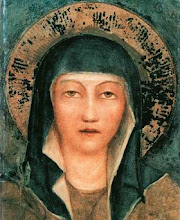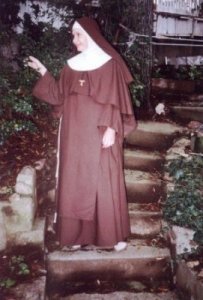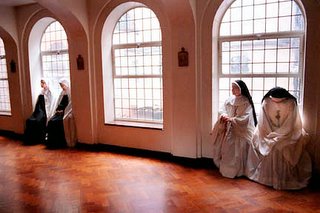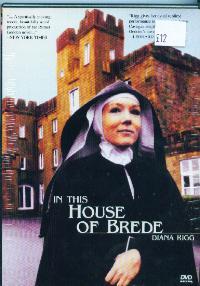
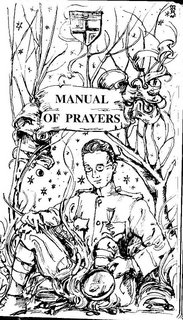
Dear Friends of “Canticle of Chiara”:
Today is a very special day for me and many people from my home Diocese of Richmond, Virginia. For today, February 7th, is the Feast Day of Francis Joseph Parater, Servant of God and Seminarian (1897-1920). Ever since I “met” Frank nearly two years ago, he has literally been my special friend in Heaven. I can attest to the fact that none of the prayers that he has interceded for me have gone unanswered. I’d like to share my personal story of how I made this wonderful friend:
Anyone who walks into my dorm room in Notre Dame is usually taken aback by one of the pictures I have on the wall. The picture in question is a portrait of a handsome 22 year old young man with wavy golden hair and a pleasant smile.
Some girls ask, “Is that your boyfriend?”
“That must be your brother,” guessed one of my neighbors.
“Neither,” I tell them. “Let’s just say……Frank is a very good friend of mine.”
As is often the case when people first meet friends, I “met” Frank very unexpectedly. I was not feeling “on top of the world” in any respect as I was sitting in the South Bend Airport that day in mid-May following my Sophomore year, ready to return to a long, hot Virginia summer. I was troubled by the fact that the day before, my boyfriend and I hadn’t parted for the summer on very good terms. Moreover, I was very concerned about the ailing health of my aging parents. Finally, I didn’t have any job or internship lined up for the coming summer, yet having one was an unspoken requisite for business students. Until I could land some sort of summer employment, I decided to work on my very ambitious summer reading list.
In order to take my troubles off my mind, I decided to start reading the first book on my reading list- George Weigel’s Letters to a Young Catholic, which has actually been signed by the author himself earlier in the year. In the book, Weigel visits different areas of the “Catholic world” and elaborates on various Christian themes that are pertinent to young adults. Having recently “come back” to the Church after a five-year period of disbelief, I found the book very edifying. However, it wasn’t until I got to about the twelfth chapter until I read the story of a young man who was to literally change my life. While Weigel’s account of Frank’s story is beautiful, I have chosen to reproduce the finest account of Frank that I have come across. I hope that you are as touched by this story as I have been!:
Frank Parater
From Roman Echoes, 1939
By Josiah G. Chatham
"So you're from Richmond, eh?" asked a bespectacled young man in cassock and red cincture.
"Sure, and Parater's my name" came the reply from the other, young and bespectacled too, but with a heavy summer tan on his cheek that his new acquaintance could not match.
The door of the College had just closed upon the Via dell-Umilta and the carrozza driver had coaxed his steed down the alley and back to the station where he had picked up young Parater, fresh from America.
Suddenly there were flying feet on the stairs as Frank Byrne rushed to the scene to be the first to meet his new and only diocesan.
Without ceremony, Frank was ushered up the stairs to the famous green door to be officially welcomed to Rome by Monsignor O'Hern, the Rector. The Rector received the lad very kindly, welcomed him to the Eternal City, only to conclude the interview with the announcement that Frank had arrived just in time to attend the afternoon lectures at the Propaganda. So that no sooner had the young Virginian been introduced to his new home than he found himself in the street again, one of the many, trooping in some kind of an indefinite group formation through the back alleys on one of the many short cuts that make Roman student life memorable.
It might be mentioned that the year was 1919, the month November. The war had only been over a short time and the American College experienced the effects as had many institutions more venerable. The few years preceding had seen each graduating class return to the "Beautiful Shore" without sending recruits to fill the ranks. Hence, the enrollment on Via dell'Umilta had fallen off to a few more than a score. But 1919 was to be a banner year; fresh blood came thick and fast. Already the new men in the house were about as numerous as the war veterans and one could almost see and feel that there was going to be a question - the question of just how to teach so many new men the "old consuetudes." This was the problem of that day of a closed Mezzanine, an empty Stables, an epidemic-filled infirmary on the Vice Rector's corridor. But it was to be a pleasant question and everybody felt that on Frank Parater's first afternoon in Rome as they picked their way under dripping laundry and between fish carts.
Three months later another procession emerged from the portals of Via dell'Umilta 30. Young Parater had died; and his companions, who had been so gay only a few days ago, walked silently behind the horse-drawn hearse and out the long way to lay the young body close to the tomb of Saint Lawrence.
Today a bronze plaque in the Benedictine High School at Richmond, Virginia reads:Frank Joseph Parater, born October 10, 1897. Died February 7, 1920. …Died in Rome while pursuing his studies for the Holy Priesthood, leaving behind him a tradition of Courage, Purity and Integrity of life.
Frank Parater was born in Richmond, October 10, 1897, of pious Catholic parents. He received his early education under the Xaverian Brothers and later under the Benedictine Fathers at Benedictine High School in Richmond. Frank was not an athletic lad, but in spite of this he became interested, at an early age, in Scouting. He was quick to see the possibilities of a movement which in recent years has received such generous support from the American Hierarchy, and with his goal in mind he set to work. The young Scout studied and worked and lived in the woods and did his good turn daily and he was so successful that later his companions were to marvel at his strength and he was to become a leader in the Scout Movement in Richmond and director of the Scout camp though still only a boy. And then Frank decided to be a priest. There were those who tried to turn him from his purpose; many of his associates couldn't understand how a youngster, so full of life and cheerfulness and so in love with the woods could ever settle down to the life of a "minister." But Frank saw his way clear and his only answer was: "It's what I ought to do, and I am going to do it." So Frank went to Belmont Abbey. He did not forget his Scouts however, and every summer found him with the boys around the campfire. His last summer in America found him director of the camp in Chesterfield County, Virginia, and there as ever he threw his heart into the work that was so dear to him. Later he was to confess that he had to bite his lip that last night around the campfire; for he had received word that he was to go to Rome
Frank liked Rome and the College at once. In glowing terms he described his first day on Via dell'Umilta, his meeting with the Rector, the afternoon class and the reception he received that afternoon when the boys returned from Propaganda. He wrote that seventy odd fellows were all laughing "and trying to shake hands with me at the same time and shouting our battle cry: 'Prosit;' for it was a grand and glorious feeling. But when the whole crowd began to sing a song… and wish me 'ad multos annos' I felt… just like I did the day camp closed… They are some men here, regular scouts." And then he goes on to say that he is "decorating his room" and wants some photographs.
Frank's cheerful demeanor and smiling countenance made him immediately the friend of everyone at the College. For an out-of-doors man, the books are not the most agreeable occupation in the world, and Frank had his troubles and his dislikes, but from his outward demeanor none would ever have suspected it. He was a good conversationalist, and usually the center of a group in the cortile where he spoke with enthusiasm of his life and work with the boys at home.
The former camp director took things Roman in regular stride: classes, walks, and study. Those were memorable days in the Via dell'Umilta when the new men outnumbered the old; when there were only three men (from the Emerald Isle all three) in Third Theology; when the First Prefect was a Second Theologian, and second Theology no doubt felt something like a religious obligation to see that the dignity of the veterans and veneration for ancient tradition were observed by the new bloods who hadn't had to take the knocks. New men probably had to watch their step pretty closely, unless they were the kind who knew how not to watch it. But Frank had no trouble. "In the new men's mix on Christmas night," writes a member of his camerata, "he received the Bean in his cake and was consequently King of the feast in the Rector's sala. We all thought at the time that it was a great joke for Parater to be the King and that he would make a buffoon out of himself. To the surprise of all he was superb. He showed that night, to me at least, that he had the qualities of great leadership… We remained to admire." But there was never anything showy about Frank. He was never any more ostentatious in his devotions that the other students. He did pray devoutly whenever the boys visited a shrine, but not to the point of being singular about it. He just followed the regular life and resolved "to hit that old Latin and Italian a terrific punch so I can return to old Virginia in five years - no, in just four-and-a-half years." That was his purpose in life, to return to his diocese and work for the conversion of those who are not of the faith. For the time, like most generous young seminarians, he hesitated as to whether he should give himself to God as a member of one of the Church's religious orders, but finally decided that the needs of the Church in the South had the first claim on him. Later he was to write: "I have offered my all for the conversions to God of non-Catholics in Virginia. This is what I live for and, in the case of death, what I die for." Frank confided to his fellow diocesan just how he hoped to tackle his job when he returned to the States: - "His chief ambition was to help boys, to work among them, to write stories for them which would inculcate into their souls high, noble, Christian ideals… He spoke, too, of the many friends outside the fold and of how he would like to help the Good Shepherd bring them back to the unity of the one flock." But all the while that Frank was working, and finding difficulty in his studies, and trying to prepare himself for the life of an apostle, there was a thought that lurked in the back of his head. It seems that he just could not resign himself to the thought of putting aside the things of a child. "Occasionally he would speak with reverent enthusiasm of the memories of early Christian Rome, and inevitably he would remark how glorious it would be to die and be buried in its sacred soil, hallowed by the blood of the martyrs." With Francis Thompson, Frank wanted to be looked for not among the patriarchs, but in the nurseries of heaven. This was the thought that was in his mind when he sat down on December 5th, 1919, and wrote his last will… just three days before he assisted, with the whole College, at the Mass of the Holy Father and received Holy Communion from his hand on the feast of Our Lady's Immaculate Conception.
A few weeks later Virginia's new man took sick. "Returning from class one morning he complained of a persistent pain in his right shoulder. We persuaded him to go to bed and called the doctor. Remedies were applied, but the pain spread, and Frank grew steadily worse," thus his friend, Father Byrne, describes the beginning of the end. In a few days the lad's condition had grown worse and he was removed to the hospital, suffering severe pain from something like inflammatory rheumatism. The pain was so intense and finally it became so bad that his body was torn with the torture; the boy lost consciousness and his companions had to take turns holding him when his suffering was most acute.
For several days he remained in this condition at the English Hospital. A nun who was there at the time tells how he used to preach one sermon after the other when he was in a state of delirium. Finally, it was evident that the end was drawing near. Frank was to realize his one ambition of seeing God as a boy face to face. Father Mahoney, the Spiritual Director and now Bishop of Sioux Falls, was called from his room in the Vice Rector's corridor where he attended the lads who had fallen prey to the "flu" to administer the last rites of Holy Mother the Church. Frank insisted that he get up and out of bed to receive Our Blessed Lord and it was only persistence that finally prevailed upon him to be content to kneel in bed. And so he did. Father asked him if he realized how serious his condition was, and he smilingly told him that he did, but that he was not afraid. And so, unafraid, he died.
"The news of his death brought sorrow and gloom to the hearts of his schoolmates at the American College. Even the students of the other colleges which attended Propaganda… were visibly affected; for they had grown to like this young American, who had always a smile and a cheerful word for everybody." So Frank's friend describes the effect of his death upon his College companions.
The body was laid in state in the Chapel and a guard was kept. Monsignor O'Hern sang the Mass of Requiem and a saddened silent group walked out in true Roman style behind the bier to see their friend laid where he had longed to be, next to Stephen and Lawrence, among the saints. But still the gloom remained in Via dell-Umilta, the spirit was gone out of the place. And then Frank Byrne found the "will." It was taken to the Rector who called the boys to the chapel almost immediately to read to them the simple, remarkable words "that were not to be read except in the event of Frank's death in Rome."
I have nothing to leave or give but my life, and this I have consecrated to the Sacred Heart to be used as He wills. I have offered my all for conversions to God of non-Catholics in Virginia. This is what I live for and, in the case of death, what I die for.
Death is not unpleasant to me, but the most beautiful and welcome event of life. Death is the messenger of God come to tell us that our novitiate is ended and to welcome us to the real life.
Melancholic or morbid sentimentality is not the cause of my writing this, for I love my life here, the College, the men and Rome itself. But I have desired to die and be buried with the saints. I dare not ask God to take me lest I should be ungrateful or be trying to shirk the higher responsibilities of life; but I shall never have less to answer for - perhaps never be better ready to meet my Maker, my God, my All.
"Since I was a child I have desired to die for the love of God and for my fellow-man. Whether or not I shall receive that favor I know not but if I live, it is for the same purpose; every action of my life here is offered to God for the spread and success of the Catholic Church in Virginia. I have always desired to be only a little child, that I may enter the kingdom of God. In the general resurrection I wish to always be a boy and to be permitted to accompany Saints John Berchmans, Aloysius and Stanislaus as their servant and friend. Do we serve God and man less worthily by our prayers in heaven than by our actions on earth? Surely it is not selfish to desire to be with Him Who has loved us so well.
"I shall not leave my dear ones. I will always be near them and be able to help them more than I can here below. I shall be of more service to my diocese in heaven than I could ever be on earth.
"If it is God's holy will, I will join Him on Good Friday, 1920, and never leave Him more - but not my will, Father, but Thine be done!
Rome, December 5th, 1919."[Signed] Frank Parater
So the Rector read Frank's last will to his fellow students. "Then for the first time since his death the atmosphere cleared," writes one of Frank's camerata mates; "a load seemed lifted from our hearts. We actually rejoiced because we felt a saint had been in our midst but we didn't know it…"
The End
It’s interesting how God brings people into our life when we least expect it, yet at the same time, when we need them the most. That day in the airport after reading Frank’s Act of Oblation, I could almost feel God placing my hand in that of Frank’s. However, even before I “met” Frank on that day, I realized that he had been looking after me for quite some time prior to that. Indeed, as his wish was to work for the “conversion of all non-Catholics in Virginia,” I knew that it was Frank who had begged God to lead me back to Holy Mother Church after five long years of stubborn unbelief. It was also Frank’s intercession that brought a wonderful new Bishop to the Diocese of Richmond in 2004. It was Frank’s influence that brought a some wonderful new priests to my parish, including a very orthodox new pastor. It was Frank that helped my relationship with my boyfriend to mature spiritually, and it was Frank that introduced me to my wonderful friends in Bethlehem Poor Clare Monastery. I can truly say that Frank is, and always will be, one of the great loves of my life. If God blesses me with a son years and years from now, I intend to name him Francis Joseph Parater. And, in the chance that God still wants me to consecrate my life to Him, I will ask my Mother Abbess if my name may be Sister Francis Joseph of the Most Sacred Heart. After all, Frank once said,
“Remember, the Sacred Heart never fails those who love Him.”
It is my experience with Frank that has taught me the true meaning of the Communion of Saints- they are there to bring us closer to God.
If you would like to report any favors granted by Frank’s intercession, please contact the Diocese of Richmond. Also, check out Frank’s official website.
As a side note, the hand-drawn picture above was drawn by my friend Matt (from Shrine of the Holy Whapping).
Happy Feast Day, Frank!!!


